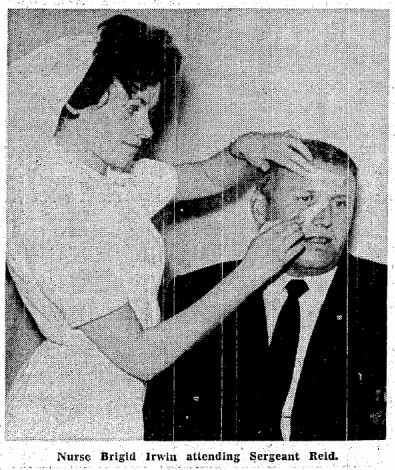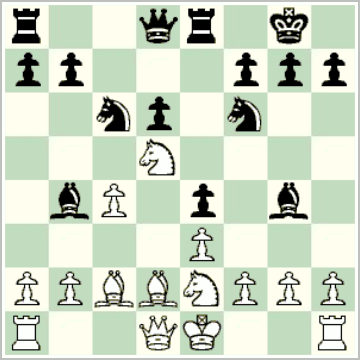A report on the Irish Championship 1962 has been added to the tournaments pages here.
This is based on joint work with David McAlister, to whom many thanks; we have been trading versions back and forth and adding details sporadically for five years or so on this.
To celebrate the fiftieth anniversary of the founding of the ICU and the tenth anniversary of the founding of the City of Derry C.C., the championship was awarded to Derry for the first time. After the all-play-all championships of the two preceding years, the format returned to the Swiss system, to be played over 8 rounds.
The field of sixteen included the defending Irish champion John Reid of Adare, who was also Munster champion; the champion of 1959 and 1960 Brian Reilly; and Ulster champion Eugene O’Hare of the host club. There were also the future Irish champions Eamon Keogh, 18 years old and playing in his first Irish championship, and 17-year-old Hugh MacGrillen, playing in his second, along with a representative selection of top players from the Leinster and Ulster leagues.
A month before the event, there was an incident that may have had a major bearing on the eventual outcome. The incident made national news, including a front page story in the Irish Press (June 16, 1962):
“Sergeant hurt in spade attack: man berserk A Garda Sergeant was injured in Mungret, Co. Limerick, yesterday, when he successfully brought under control a 28-year-old six-foot Limerick man who went berserk with a spade.
Sgt. John Reid of Patrickswell — he was Irish chess champion last year and is a well-known rugby player — had an artery in his right arm severed in the struggle. …”

The championship opened on July 14, and the shock of the first round was the loss Brian Reilly suffered at the hands of the local player Larry Finlay. John Reid won a pawn against Maurice Hughes but had to settle for a draw after a bishops of opposite colour ending was reached.
In round 2, the local player Matt O’Leary forged into the sole lead by defeating Donal Déiseach, in what seems to have been a surprise: Déiseach had been tipped prior to the event as one of the leading contenders. Michael Littleton drew against Larry Finlay and Alex Montwill drew against Ulster’s Noel Mulholland, leaving each ½ point off the lead. Brian Reilly recovered from his opening round setback with a win against Eugene O’Hare. On the other hand, John Reid drew again, this time against Eamon Keogh.
In round 3, Matt O’Leary continued his run of successes with a win against his clubmate Larry Finlay to reach 3/3. Alex Montwill won against Ulster’s David Kerr to reach clear second on 2½, ahead of five players on 2, including Littleton, who drew again, and Reilly, who won again. Once again, for the third successive game, John Reid drew, this time against Hubert Boyd of Derry. Was this slow start due to the aftereffects of his unpleasant experience a month earlier?
In round 4, Montwill beat O’Leary, to lead with 3½ to O’Leary’s 3. Keogh and Littleton drew, as did Mulholland and Reilly, while Reid finally won, against MacGrillen. This left five players tied for third place on 2½: Keogh, Littleton, Mulholland, Reid, and Reilly.
In round 5, Montwill lost to Keogh, leaving five players tied for first on 3½/5: Keogh, Montwill, O’Leary, Reid, and Reilly. Littleton, who drew for the fourth consecutive round, fell to joint 6th on 3.
In round 6, Keogh lost in turn to O’Leary. Reid beat Reilly, and both Montwill and Littleton won, leaving Montwill, O’Leary, and Reid joint first on 4½/6, with Littleton clear fourth on 4.
In round 7, O’Leary and Reid drew on top board; Eugene O’Hare’s report says that O’Leary missed a win. Littleton beat Montwill, and Reilly beat Keogh. This left Littleton, O’Leary, and Reid joint first with 5/7, with Montwill and Reilly joint fourth on 4½, and all others out of contention.
In the last round, Reid and Littleton drew in 18 moves in a King’s Indian. This seems strange: in light of what followed, it seems as if one or the other, probably Littleton, should have been inclined to play on. O’Leary could have secured the Irish championship by winning against Reilly. As it was, he lost fairly quickly with the black pieces. Montwill won against Hubert Boyd, after an adjournment.
This left four players in joint first with the low score of 5½/8, the only time in the history of the Irish championship that there has been a four-way tie. The tiebreak system was Sonneborn-Berger, which had been used to break three ties in the 1950’s (1953, 1955, and 1957) and was to be used again in 1967. Reid was adjudged the winner, and the shield duly presented. It was a remarkable comeback after his slow start.
However, it was soon discovered that there was a snag: Reid and Littleton had the same Sonneborn-Berger score (Montwill was third and Reilly fourth). What next? There seems to have been no provision for this possibility, but in the entire history of the Irish championship, all ties had been broken in one way or another to produce a single champion. In this case, it was initially assumed that there would be a playoff match for the title, of 4 or 6 games. It was announced two months later, though, that there would be no playoff match and that they would share the title.
Strangely, the four players who eventually tied for first had not met each other at all up to the end of round 5, and there was only one game between players of this set in each of the last three rounds. On the other hand, Matt O’Leary played all other players who finished in the top 7, plus one of those who finished joint 8th, while Eamon Keogh, who finished in clear 7th, one point off joint first, played all six players who finished above him.
Only one game survives, featuring an imaginative sacrifice by Donal Déiseach against David Kerr in round 4.

Position after 11. Nd5
In the diagrammed position, Déiseach played the startling 11… Nd4!!??. He deserves full credit for creativity, but was this sound, as contemporary sources assumed?
